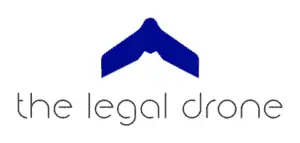If you are flying a drone in the United States that weighs .55 pounds or more, you will need to register it. Exactly how you register your drone depends on a few factors, including whether you are a commercial or recreational drone pilot and the weight of the drone.
This article will walk through all the details of the following:
- The drone registration requirements for Part 107 and recreational drone pilots,
- Do I have to register my drone?
- The process to register your drones,
- What to do if you have multiple drones,
- How to label your drone with the registration number,
- The cost of registering your drone,
- How long your drone registration lasts,
- What happens if you don’t register your drone, and
- Why the FAA is requiring drone registration.
What are the drone registration requirements?
If you meet the following requirements, you can register your drone online through the FAA’s Drone Zone, which is pictured below.
- It costs $5.00 to register a drone
- The person registering the drone must be 13 years of age or older
- The drone must weigh between .55 pounds and 55 pounds (we will talk about what to do with drones larger than 55 pounds below).
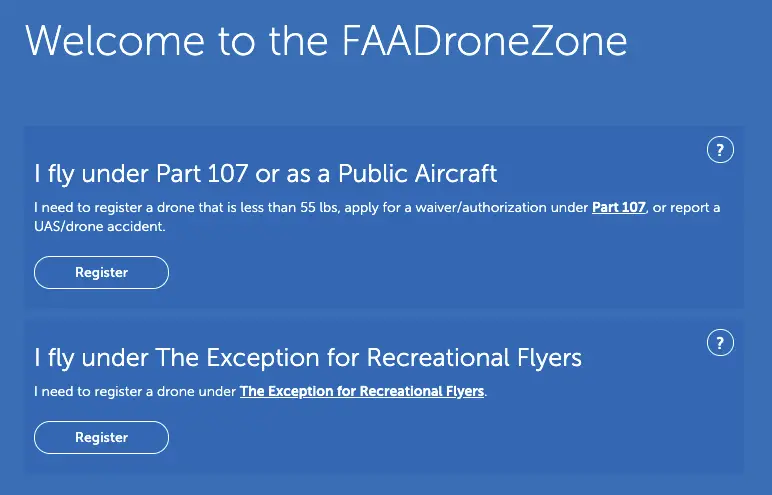
Do I have to register my drone?
The only real factor here is whether your drone weighs .55 pounds or more. If you own a drone that weighs .55 pounds or more, it needs to be registered, end of story. There are no other exceptions.
So, a drone like the Holy Stone HS170 Predator Mini (Amazon affiliate link) does not need to be registered. In fact, if you go buy a drone, this weight limit has sort of become the default line between what most people consider a “toy” versus an “aircraft.” And this make sense, I’m not sure how much damage you could do with a drone the size of the Holy Stone. With the actual flight time on drones this size being under 10 minutes, I doubt you could even get the drone that high, since you would need a few minutes to get it back down again safely before the battery ran out.
What is the drone registration process?
This is where a couple of different path emerge. Nothing too difficult, but once you get to the Drone Zone, as pictured above, you have two choices. You can either register your drones as a commercial (Part 107) pilot or as a recreational flyer.
One word of warning before getting into the weeds. There are apparently a bunch of websites out there that provide the “service” of helping you register your drone. Don’t use these sites. First, they may charge you more than it actually costs for their “service,” but in reality, the registration process is super simple and there’s just no need for these services. Also, by just logging on to the FAA’s Drone Zone website, you know for sure that your drones are properly registered because there’s no middle man. Finally, because you are registering your drone with your personal information, doing it yourself saves you from giving out that information to an unknown third-party.
Part 107 drone registration
If you are a commercial pilot, flying under Part 107, you will obviously need to register your drones that way. The difference is that as a commercial drone pilot, you will need to register each drone that you use. When you first login, you will see a “Part 107 Dashboard” that provides you with an inventory of your drones, including their current registration status. As you can see from my dashboard, I have one drone that is currently registered and another that is listed as “canceled.” The canceled drone is one that we no longer use and so it was not re-registered on this account.
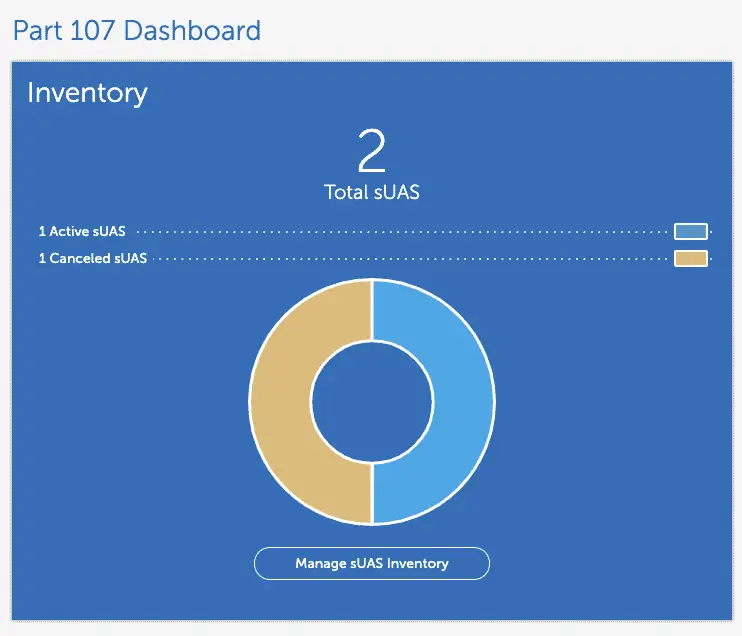
You are also given the ability to “Manage sUAS Inventory.” If you click this link, you can add a drone to your account by filling out all of the required information, as pictured below. Pretty simple.
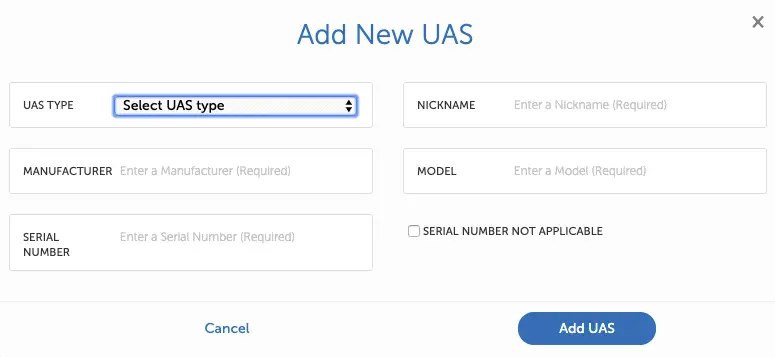
Once you are on this drone inventory page and have a drone registered, you are provided with a list of all your drones, their status (registered, canceled, etc.) as well as the serial number, registration number and the date that your drone registration expires. If you have a home built drone, there is even an option to register it. I’d assume that you would just create your own serial number on home built drones.
Remember, your drone registration is only good for 3 years. What I would do is set a calendar reminder to renew again in three years. The last thing you want to do is forget to renew and keep flying your drone even though the registration is expired.
If you are registering a drone that weighs over 55 pounds, you will unfortunately still have to register via a paper application. I’m assuming a drone over 55 pounds will be used for commercial purposes but I’m also assuming that most people won’t have to worry about this. If you do, here’s the link to the paper registration if you need it.
Recreational drone registration
I know people generally aren’t fans of registration, especially when it comes to hobbyist drone users. Yes, one D.C. hobbyist even sued the FAA (and won) over registration of hobbyist drones. But the rules have changed again, and you are required to register your drones even if you are a hobbyist drone pilot flying under Section 336 (check out my article here for info on the other new hobbyist rules.)
The difference between registering drones as a commercial drone pilot and a recreational drone pilot is that when you are a recreational drone pilot, you are essentially registering yourself. And the FAA makes this really easy. When you log in to your Drone Zone account as a Part 107 pilot, you will be provided with a screen that allows you to switch over and handle anything you may be doing as a recreational pilot. You can even automatically copy over your account info to your recreational account (if you want) so that you don’t have to enter all your info twice. The links to switch between accounts look like the picture below.

Once you’ve registered yourself as a recreational drone pilot, you will be assigned a number (much like a Part 107 license number) except that this number doubles as your drone registration as well. No need to register multiple drones. In fact, the Drone Zone doesn’t even provide a way for you to do that.
What if I have multiple drones?
If you have this question, re-read the section above for clarification. Basically, if you are registering a drone as a commercial drone pilot, you have to individually register each drone you use for commercial purposes.
If you are a recreational drone pilot, you only have to register yourself as a recreational drone pilot and then use the number provided on all of your recreational drones.
Do I actually have to label my drone after I register it?
Yes, you do. No matter if you are a recreational drone pilot or a commercial drone pilot.
Even though the answer to this question is pretty short and straightforward, I’ll expound (like any good attorney).
Remember, if you are a recreational drone pilot, your personal registration number doubles as your drone registration number. If you are a commercial drone pilot, you will have a separate drone registration number for each drone.
There are services out there that provide drone registration labels, which you can just buy. They’re pretty cheap and definitely serve the intended purpose. Here’s one that’s highly rated for recreational drone pilots (Amazon affiliate link). Here’s another one for commercial drone pilots (Amazon affiliate link). They both come with multiple labels as well as a lanyard and ID card. You could also put your commercial drone license in this ID card holder if you wanted to.
Another thing I thought was really cool about these labels was that they included two other stickers, one to put your phone number on and the other encouraging anyone that finds your drone (in the event of a crash or flyaway) to contact you by going to reclaimdrone.com.
What we did for my drone services company was just buy a label marker, like this one (Amazon affiliate link). And even if you opt to go this route, you could still use the label maker to encourage anyone that finds your drone to go to reclaimdrone.com. It’s a free service. All you have to do is add your drone (or drones) to their database.
Be careful though, if you have a tendency to get carried away with organizational tools, the label maker can be addicting.
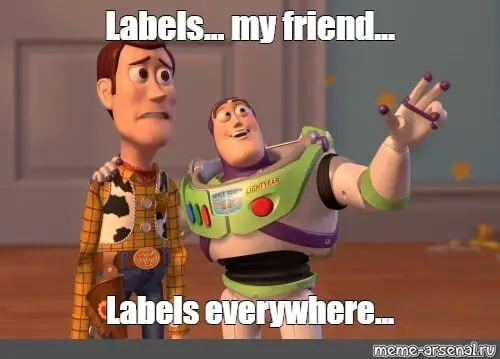
You’ve been warned…
How much does it cost?
If you’re registering drones as a commercial drone pilot, it will cost you $5.00 for each drone.
If you are registering as a recreational drone pilot, you register yourself once and use this registration number on all of your drones. This also costs $5.00 (no matter how many drones you have).
Both registrations last for three years.
What happens if I don’t register my drone?
Failure to register your drones (or yourself as a recreational drone pilot) could lead to FAA fines of up to $27,500 for civil penalties and/or up to $250,000 for criminal penalties. While the chances of this are unlikely, it’s totally worth it to spend $5.00 now to avoid some legal headaches and monetary fines later. Just do yourself a favor and register your drones.
Why is the FAA requiring drone registration?
While many hobbyist drone pilots may think that FAA drone registration is overkill, it is important to understand the situation from the point of view of the FAA. An entire new industry has cropped up over the past few years and although some people may think of them as toys, these “toys” are flying in the national airspace. Never before has a remote control “toy” had the current ability to effect safe manned flight in the way that drones do now. So the FAA is encouraging the public to think of drones as aircraft, because that’s basically what they are. Besides, we’ve all seen the news stories of drone pilots that didn’t get the memo.
- There was the guy that crashed a drone on the White House lawn
- The people that majorly disrupted air travel at Gatwick Airport in London for nearly three days
- The drone that crashed into the stands at a major league baseball game, or
- The guy that was sentenced to community service after crashing his drone into the stands at the U.S. Open.
The important thing to understand is that manned pilots operate under a set of rules making these situations unheard of before drones came on to the scene. And I get it, most people don’t operate their drones recklessly, but honestly, there are also a lot of people that just don’t understand that what they’re doing endangers people. So although drone registration may seem excessive to some, its been around since December of 2015 in some form and it looks like it is here to stay.
Disclaimers:
This page contains an affiliate links. They costs you nothing but can get a commission if you purchase a service using this link. If I’ve provided you with any value, this is a great (and free) way to support me on a service you’re probably going to purchase anyway.
Also just a reminder, while I am an attorney, nothing on this website should be taken as legal advice. This website is just for research and educational purposes. Nothing about this website creates an attorney-client relationship. If you need to speak with an attorney, I highly recommend finding one that is licensed in your state and consulting with them. My full disclosure is available here.
